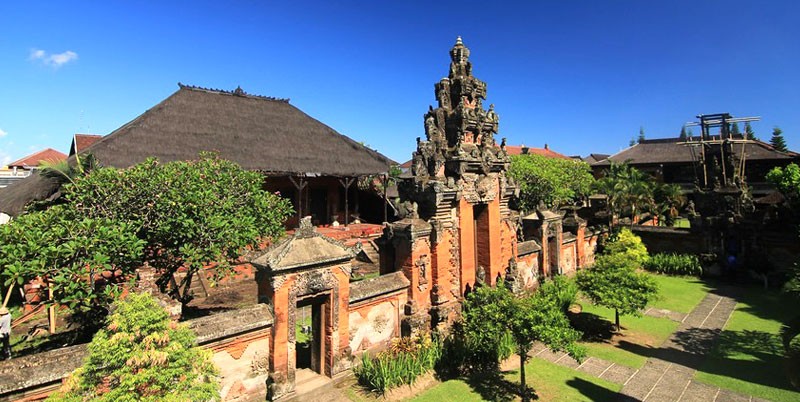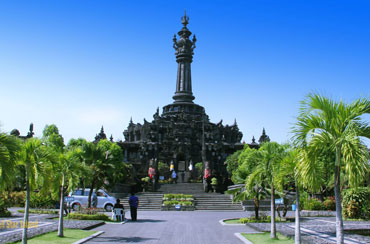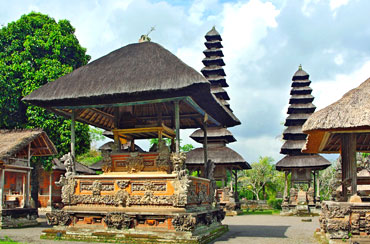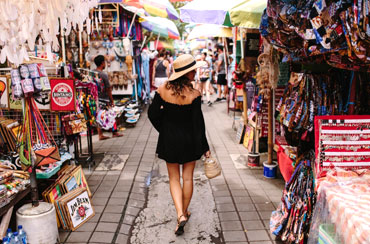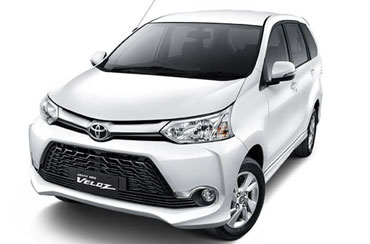BALI MUSEUM
BALI MUSEUM IS ONE OF THE MOST POPULAR BALI PLACES OF INTEREST IN DENPASAR AND IS BEGUN BY THE EXISTANCE OF INITIATIVE HOW TO VITALLY THE HERITAGE OF BALINESE CULTURE
Bali Museum is one of the most famous Bali Places of Interest strategically located in Jalan Major Wisnu in the heart of Denpasar City. In the north side of it there is the glorious temple of Jagatnatha, meanwhile in front of it (west side) there are the famous Puputan Badung (Badung Courtyard) and the four face statue (Catur Muka Statue). Established in an area of 2,600 m2 which are divided into three yards : outer yard (jaba), middle yard (jaba tengah) and the inside yard (jeroan) is bounded by a wall and a gate.
How to Get to Bali Museum
Bali Museum is strategically located in Jalan Mayor Wisnu, Dangin Puri Denpasar Bali 80232 in the heart of Denpasar City. In the north side of it there is the glorious temple of Jagatnatha, meanwhile in front of it (west side) there are the famous Puputan Badung (Badung Courtyard) and the four face statue (Catur Muka Statue). From Ngurah Rai airport to the Bali museum is 15 kilometers away and from Ubud to the Museum, you need 1 hour travel time or about 30 kilometers.
What to Expect at Bali Museum
The next question is, what is the benefit of visiting the Bali Provincial State Museum, surely this will be a question for those who have never visited this Museum. Bali Provincial State Museum is an ethnography museum. Therefore you must be interested in history or like to see the typical Balinese architecture. However, suppose you don’t have an interest in Balinese antiquity. In that case, it will be difficult for you to feel the benefits of visiting the Museum. Bali Provincial State Museum differs from the existing Museum in Ubud tourist attractions. In the Bali Museum, you can see an art collection with historical value from Balinese culture. Museum collections consist of ethnographic collections such as equipment used during prehistoric times, religious and customary ceremonial material, and Balinese art and culture development from time to time. By seeing the museum collection, you will compare the form of a Balinese civilization from a prehistoric era to modern times.
What You Can See at Bali Museum
As one of the museums in Denpasar which is very complete with historical stories from culture in Bali which has several collections of ancient civilizations found in Bali, which will add to your full insight about this beloved and very unique island of Bali. The object collections or ancient tools kept at Bali Museum can be classified into prehistoric object collections such as tombstone (sarkophag), the object collection from the historical era such as Stupika clay containing mantra 'Ye te', bronze statues (Arca Perunggu), and ethnographic objects such as the collection of Kris, Endek material, religious ceremony equipment and Sidakarya Mask.
Can be classified become the prehistoric object collection like: the Grave Petrify (sarkophag), the object collection coming from history era like: stupika clay containing superstitious formula Ye Te, the bronze statues (Hindu andBudha statues) and ethnography object collection like Keris, Endek Cloth, and religious ceremony equipments (Sangku, Cecepan and Sidakarya mask) and also some unique collections that are no less interesting. Those are some pre-historic collections that you can see here, very suitable for those of you who like history and want to know about the history of the development of Bali from the past to the present and know the developments from era to era to the present day.
Bali Museum History
The fall of the Kingdom of Klungkung into the hands of the Dutch colonists on April 28, 1908 has signaled the change of power in Bali into the territory of the Dutch colonial government. This situation made a change in governance in Bali from being somewhat closed to outsiders to becoming more open to Europeans, especially the Dutch during the European colonial period in Indonesia. All other foreign nations became more and more free to come to Bali. They consist of various layers of society who often bring Balinese souvenirs as souvenirs when they return to their country.
This condition made the existence of Balinese cultural heritage threatened, thus causing Dutch scientists and culturalists as well as artists to try to prevent this and to preserve Balinese cultural heritage. The initial idea for the establishment of the Bali Museum was initiated by architect W.FJ Kroon (1909-1913) who was also an assistant resident of southern Bali in Denpasar. The idea was realized with the establishment of a building called Gedung Arca in 1910, while the architects who built the Bali Museum were I Gusti Gede Putu Kandel from Banjar Abasan and I Gusti Ketut Rai from Banjar Belong together with a German architect, Curt Grundler.
For funds and materials provided by the Kings of Buleleng, Tabanan, Badung and Karangasem. The chairman of the antiquities service at that time was W.F Stturterhim who continued efforts to complete the ethnographic treasury in 1930 and to facilitate the management of the museum, a foundation was formed, chaired by H.R Ha'ak with its members and the foundation's personnel. In 1932 and at the same time the Bali Museum was opened to the public which became a museum for storing relics of the human past and ethnography. The museum collection consists of ethnographic objects including tools and equipment for life, art, religion, written language, and others that reflect the life and development of Balinese culture in the past.
Bali Museum Geography
The museum building is designed in a typical puri or royal style in Denpasar, which has a museum complex pavilion representing various regencies on the island of Bali. So you can visit the Bali museum and see various historical relics of each district with the uniqueness and beauty of each district will make your insight increase, So in one place you can find out the history of the island of Bali as a whole, a museum place that is very suitable for tourists. students who want to know more about the island of Bali, the geography of the Bali Museum is as follows:
• Tabanan Pavilion: Located in the north and stores collections - keloksi such as dance equipment, dance costumes, all kinds of masks for dance, wayang kulit, keris (traditional Balinese sword) for Calonarang as well as some ancient statues from ancient times in tabanan district.
• Buleleng Pavilion: Located in the center of the building has a typical temple style in North Bali and stores various kinds of collections such as Balinese clothing from Buleleng and also traditional fans made in Buleleng long ago and also some other important relics found.
• Badung Pavilion: Located at the entrance with a high bale kulkul and stores various kinds of prehistoric collections used by humans during hunting and farming, cultivation and metallic periods in antiquity and also displays a collection of fine arts in Bali.
• Karangasem Pavilion: Located in the eastern part and holds a depiction of traditional building art from the eastern part of Bali. This building contains several exhibitions of paintings, fine arts, archeology and several objects from pre-historic times which are very full of history.
The building area of the Bali Museum is 2600 square meters with three pages, namely the outer courtyard (jaba), the middle courtyard (jaba Tengah) and the inner courtyard (offal) which are bordered by walls and gates. The gate here is named Candi Bentar and Candi Kurung serves as the entrance, and there is a Kulkul Hall (wooden bell) which is located to the south of Central Jaba. Meanwhile, in the northwest corner stands the Bengong Hall which was used during the royal era as a place for the King's family to rest if they want to observe the atmosphere outside the palace. In addition, there is also a beji, which is a bath for the royal family placed in front of the Tabanan Building. The roof of the fibers is only used for the roof of the temple building.
Bali Museum Entrance Ticket
Adult : IDR 50,000Children : IDR 25,000
Opening Hours : 07.30 AM - 03.30 PM
Explore Related Bali Tour to Bali Museum
Denpasar City Tour
Denpasar City Tour is one of the best Bali Half Day Tours to visit Bajra Sandhi Monument, Badung Traditional Market, Jagatnatha Temple and Bali Museum for your memorable trip in paradise island of Bali ...... Read More
Denpasar City and Uluwatu Temple Tour
Denpasar City and Uluwatu Temple Tour is wonderful Bali Full Day Tours to visit Bajra Sandhi Monument, Badung Market, Jagatnatha Temple, Padang Padang Beach, Uluwatu Temple and watching Kecak and Fire Dance ...... Read More
Denpasar City and Tanah Lot Temple Tour
Denpasar City and Tanah Lot Temple Tour is amazing Bali Full Day Tours to visit Bajra Sandhi Monument, Badung Market, Jagatnatha Temple, Taman Ayun Temple, Alas Kedaton Monkey Forest, Tanah Lot Temple ...... Read More
Denpasar City and Ubud Tour
Denpasar City and Ubud Tour is impressive Bali Full Day Tours to visit Bajra Sandhi Monument, Badung Market, Jagatnatha Temple, Ubud Monkey Forest, Ubud Palace, Ubud Market and Tegalalang Rice Terrace ...... Read More
Bali Car Charter
Bali Car Charter that we provide is for your smart choice to explore the beauty of Bali, arrange your own trip and enter the un-spoilt places and see Bali culture deeply. Our cars are well maintained and fully equipped with a/c car ..... Read More
BALI FULL DAY TOURS
- East Bali Tour
- West Bali Tour
- North Bali Tour
- Bali Dolphin Tour
- VW Safari Bali Tour
- Mount Batur Trekking
- Bali Temples Tour
- Ubud Full Day Tour
- Kintamani Volcano Tour
- Bedugul and Tanah Lot Tour
- Tanah Lot and Uluwatu Temple Tour
- Nusa Penida Tour
- Nusa Penida Tour with Snorkeling
- The Gate of Heaven Tour
- Read More
BALI COMBINATION TOURS
- Bali Rafting and Ubud Tour
- Bali Swing and Ubud Full Day Tour
- Bali Elephant Ride and Ubud Tour
- Bali ATV Ride and Ubud Tour
- Bali Water Sports and Uluwatu Tour
- Bali Safari Park and Uluwatu Tour
- Bali Horse Riding and Ubud Tour
- Bali Cycling and Ubud Tour
- Bali Trekking and Ubud Tour
- Bali Spa and Uluwatu Tour
- Bali River Tubing and Ubud Tour
- Read More
BALI ACTIVITY PACKAGES
- Bali Rafting and Spa Packages
- Bali Rafting and Cycling Packages
- Bali Rafting and ATV Ride Packages
- Bali Rafting and Bali Swing Packages
- Bali Rafting and Elephant Ride Packages
- Bali Water Sports and Spa Packages
- Bali Horse Riding and Rafting Packages
- Bali Horse Riding and Elephant Ride Packages
- Bali Trekking and Spa Packages
- Bali ATV Ride and Bali Swing Packages
- Read More
BALI TRIPLE ACTIVITIES
- Bali Rafting + Cycling + Spa Packages
- Bali Rafting + ATV Ride + Spa Packages
- Bali Rafting + Horse Riding + Spa Packages
- Bali Rafting + Elephant Ride + Spa Packages
- Bali Water Sports + ATV Ride + Spa Packages
- Bali Seawalker + Rafting + Spa Packages
- Bali Seawalker + ATV Ride + Spa Packages
- Bali Seawalker + Elephant Ride + Spa Packages
- Bali Trekking + Rafting + Spa Packages
- Bali Trekking + Elephant Ride + Spa Packages
- Read More

